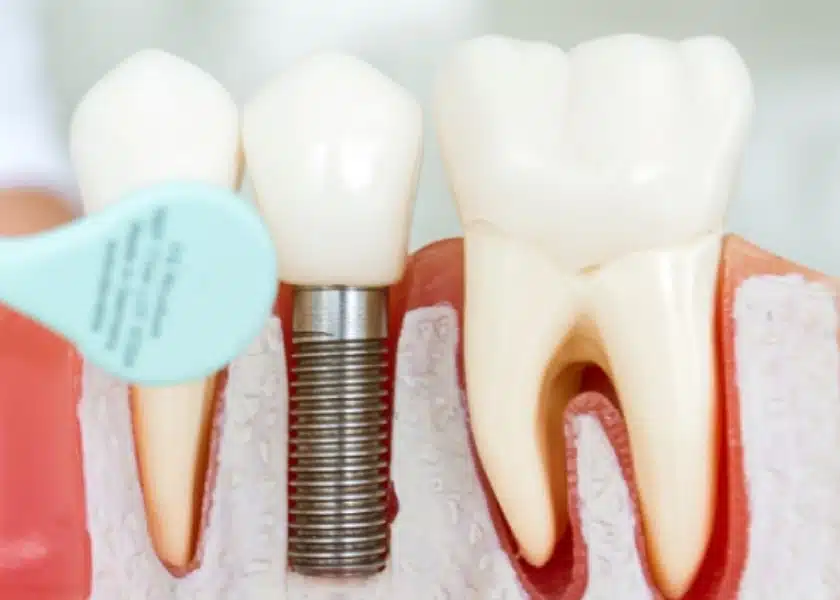How long does a dental implant procedure take? This question often arises among individuals considering dental implants as a solution for missing teeth. Understanding the timeline of the dental implant process is crucial for informed decision-making and managing expectations. From initial consultation to final restoration, each stage has a vital role in the success and duration of the implant journey.
Let’s look into the various phases of the dental implant procedure and explore the factors influencing its timeline.
Three phases of dental Implant Procedure
The dental implant process comprises three phases, varying for each individual. Generally, it spans from 5 to 8 months. However, for those receiving full-mouth dentures, the timeline may be expedited for individuals acquiring a complete set of teeth.
Dental Implants Phase 1 – Evaluation and Preparation
This phase includes tooth extraction and potential bone grafting if required. A CT Scan is conducted to assess the existing dentition and bone structure at the implant site. If bone grafting is necessary, Phase 1 extends for 3 to 6 months. Bone grafting is typically needed for long-term tooth loss, where bone loss occurs at twice the normal rate within the first year. Early placement of the artificial root is crucial to minimize dental implant costs and procedure duration.

Dental Implants Phase 2 – Artificial Root Placement
During Phase 2, the artificial root is surgically implanted into the bone and left to heal. The procedure lasts 1 to 2 hours, with a healing period of 3 to 6 months. Throughout this time, the titanium alloy implant, akin to materials used in joint replacements, integrates and fuses with the adjacent bone tissue—few medical implants designed for bearing loads exhibit such rapid healing and recovery times.
Dental Implants Phase 3 – Crown Placement
During Phase 3, an artificial tooth or crown is affixed to the artificial root that was previously embedded in your jawbone. Your mouth is carefully assessed, and an impression is taken to create a tooth that matches your mouth’s specifications in terms of size, shape, and color. Typically, this phase entails two visits spaced about two weeks apart.
Bone Graft or Sinus Augmentation adds more time to the Dental implant process
Bone grafts and sinus augmentations may be necessary to prepare you for dental implants. If these procedures are required, the overall dental implant process will take longer.
The extended duration is due to the need for additional surgical procedures and the time required for proper healing before proceeding with subsequent oral surgeries.
The bone graft or sinus augmentation should heal before dental implants can be installed. Premature placement can result in implant failure due to insufficient bone strength or stability to support the implant post. Over time, the implant may become loose and eventually dislodge.
Typically, the procedure for bone grafts or sinus augmentations lasts slightly over an hour. In cases where only a small bone graft is needed, the procedure may take as little as 20 minutes. For more extensive bone grafts or complex graft placement, the surgery may take between one and one and a half hours to complete.

The Healing Process
Following the surgery, you’ll return home to begin the recovery phase. Unfortunately, recovery from dental implants is lengthy and typically spans a few months. During this period, it’s crucial to maintain excellent care of the treated area.
Keeping the area clean and avoiding foods that could irritate it helps prevent infections. Swelling and discomfort in the implant area are normal, especially in the initial days after surgery. With the help of pain medications and ice packs, most of the pain and swelling should diminish within a few weeks.
The recovery phase is as vital as the surgery itself. Inadequate healing may hinder the progress of your dental implant. Around three months later, you should notice that the metal post has healed properly in your mouth.
Your jawbone should have fused around the metal post, securing it in place. At this point, you can schedule your next appointment.
Dental implants take time, but the final result is good
The journey from start to finish in the dental implant process can span several months to a year. Despite the time investment, the transformation of your smile at the end makes every moment worthwhile.
Interested in exploring dental implants? Schedule a consultation with Diamond Dental, Mt. Vernon, WA, to assess your candidacy for dental implants and provide detailed insights into the procedure. Book your consultation by contacting our dental office or filling out our contact form.
FAQs
Yes, if additional procedures are required, the overall timeline may be extended. The healing time for these procedures must be factored in before proceeding with the dental implant process.
Factors such as the patient’s overall health, bone density, and the complexity of the case can influence the duration of the dental implant procedure.
The recovery period varies but typically involves a few months. Patients may experience swelling and discomfort initially, but these symptoms should subside with time and proper care.
While the dental implant process requires time for proper healing and integration, patients can promote healing by following post-operative care instructions provided by their dentist.






